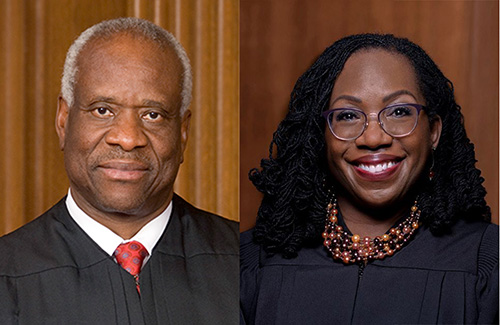Judicial Council’s Decision on Justice Thomas and Jackson
The U.S. Judicial Conference recently made a significant announcement regarding allegations of ethical violations involving Supreme Court Justices Clarence Thomas and Ketanji Brown Jackson. The Council has decided not to refer either justice to the Department of Justice for investigation concerning claims of failures in disclosing pertinent financial information. This decision has sparked discussions about judicial accountability and the ethical standards applied to the nation’s highest court.
Background of the Allegations
The controversy surrounding Justice Thomas arose from multiple allegations regarding undisclosed financial transactions involving billionaire Harlan Crowe. Democratic members of Congress, including Senator Sheldon Whitehouse and Representative Hank Johnson, scrutinized Thomas for allegedly failing to disclose the sale of three properties to Crowe and accepting gifts, including a luxury trip. Furthermore, it was reported that Crowe financed Thomas’ grandnephew’s private schooling and that Thomas purchased an RV using a loan from another affluent acquaintance.
Justice Jackson’s Situation
On the other hand, Justice Jackson faced inquiries from the conservative group Center for American Renewal. They called for an investigation concerning her supposed non-disclosure of income from her husband’s medical malpractice consulting work and potential undisclosed donations related to her investiture ceremony. The juxtaposition of these inquiries highlights the increasing scrutiny that Supreme Court justices face from both sides of the political aisle regarding their adherence to ethical standards.
Judicial Council’s Response
In response to these calls for investigation, Senior U.S. District Judge Robert J. Conrad Jr., who serves as Secretary of the Judicial Council, stated that both Justices Thomas and Jackson had addressed the issues raised by submitting amended disclosure statements. His letter emphasized that the concerns alleged by lawmakers and civic groups had been mitigated through these updates, suggesting that the justices were responsive to the issues raised by their critics.
Exemptions and Interpretations of Ethics Rules
Moreover, the Judicial Council underscored the complexities surrounding the Code of Ethics applied to federal judges and justices. According to the existing guidelines, individuals are exempt from disclosing personal entertainment gifts. However, a new directive issued earlier in 2023 specified that this exemption does not apply to gifts related to transportation or properties typically rented for business purposes. The Council clarified that these newer guidelines would not retroactively apply to past disclosures, contributing to ongoing confusion about the ethical landscape surrounding disclosures in the judicial context.
Authority to Refer Cases
Additionally, the Judicial Conference expressed uncertainty regarding its legal authority to refer Supreme Court justices to the Justice Department. This raises important questions about the separation of powers and the mechanisms in place to hold justices accountable for ethical lapses, suggesting a potential need for reform in how ethical guidelines are applied to Supreme Court justices and whether lawmakers can exert influence over these matters.
Conclusion
The decision by the U.S. Judicial Conference not to refer Justices Thomas and Jackson for further investigation underscores the complexities involved in judicial ethics and accountability. While on one hand, the justices have taken steps to address the scrutiny by amending their financial disclosures, the enduring questions surrounding the effectiveness of the existing ethical framework remain prevalent. It invites a broader conversation about the future of judicial oversight, public trust in the Supreme Court, and the necessary reforms that may be required to safeguard ethical standards within the highest echelons of the judiciary.
FAQs
Q: What prompted the investigation into Justices Thomas and Jackson?
A: The investigation was prompted by allegations of undisclosed financial transactions and gifts, raising concerns about their adherence to ethical standards.
Q: What was the outcome of the Judicial Conference’s decision?
A: The Judicial Conference decided not to refer either justice to the Department of Justice for investigation, indicating that both justices have amended their disclosure statements.
Q: Are Supreme Court justices required to adhere to the same ethical standards as other federal judges?
A: Yes, they are governed by ethical guidelines; however, there are complexities and differing interpretations regarding disclosure requirements.
Q: How does the new guidance on disclosures affect past reports?
A: The new guidance will not be applied retroactively to previously filed reports, which has caused some confusion.
Q: What implications does this decision have for judicial accountability?
A: This decision raises questions about the effectiveness of current judicial oversight mechanisms and highlights the potential need for reforms aimed at enhancing accountability among Supreme Court justices.

